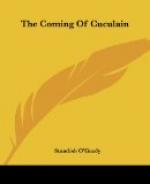“O Culain, feasting and singing are good, but slumber is good also. Dismiss us now to our rest and our slumber, for we, the Red Branch, must rise betimes in the morning, having our own proper work to perform day by day in Emain Macha, as you yours in your industrious city.”
With difficulty were the smiths persuaded to yield to that request, for right seldom was there a feast in Dun Culain, and the unusual pleasure and joyful sense of comradeship and social exaltation were very pleasing to their hearts.
The Ultonians slept that night in the smiths’ hall upon resplendent couches which had been prepared for them, and early in the morning, having taken a friendly leave of the artificers, they departed, leaving the lad behind them asleep. Setanta remained with the smiths a long time after that, and Culain and his people loved him greatly and taught him many things. It was owing to this adventure and what came of it that Setanta got his second name, viz., the Hound of Culain or Cu-Culain. Under that name he wrought all his marvellous deeds.
CHAPTER IX
THE CHAMPION AND THE KING
“Sing, O Muse, the destructive
wrath of Achilles, son
of Peleus, which brought countless woes upon
the Achaeans.”
—Homer.
Concobar Mac Nessa sat one day in his high chair, judging the Ultonians. His great Council sat before him. In the Champion’s throne sat Fergus Mac Roy. Before the high King his suitors gave testimony and his brehons pleaded, and Concobar in each case pronounced judgment, clearly and intelligently, briefly and concisely, with learning and with equity.
“Right glad am I, O Concobar,” said Fergus, “that thou art in the King’s throne, and I where I sit. Verily, had I remained in that chair of honour and distress, long since would these historians and poets and subtle-minded lawyers have talked and rhymed me into madness, or into my grave.”
Concobar made answer—“Dear foster-father, the high gods in their wisdom have fashioned us each man to illustrate some virtue. To thee they have given strength, courage, and magnanimity above all others; and to me, in small measure, the vision of justice, and the perception of her beautiful laws. A man can only excel in what he loves, and verily I love well the known laws of the Ultonians.”
A great man just then entered the hall. His mantle was black. In the breast of it, instead of a brooch, he wore an iron pin. He came swiftly and without making the customary reverences. His face was pale, and his garments torn, his dark-grey tunic stained with blood. He stood in the midst and cried—
“O high King of the Ultonians, and you the wise men and sages of the children of Rury, to all of you there is now need of some prudent resolution. A great deed has been done in Ulla.”
“What is that?” said the King.




